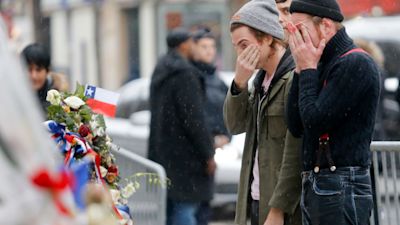Insight
Paris terror attack: Historic trial hoped to bring an end to six years of national trauma

ITV News Europe Editor James Mates explains the significance of this mammoth trial
The trial into a Paris terror attack that killed more than 130 people will dominate France, not just the country's news bulletins, for the next nine months.
The accused, victims and politicians will address the court amid physical disruption - the centre of Paris has been sealed and secured as huge convoys of prisoners will be brought into and out of the area each day. On that appalling night in November 2015, nine gunmen and suicide bombers struck within minutes of each other at France’s national football stadium, the Bataclan concert hall and Paris restaurants and cafes.
Most of the attackers are dead. Five of the 20 suspected of involvement are presumed dead, with a sixth on the run. Those who masterminded the attacks remain unknown and beyond the reach of French justice. And yet this trial is of enormous importance.
Of the 14 in court, only one – Salah Abdesalam – is accused of playing a direct part in the attacks. It’s alleged that he declined to trigger his suicide vest and fled to Belgium.
In court on Wednesday, he refused to give his name or profession, saying only: “There is no god but Allah, I renounced my profession to become a fighter for jihad.” The other 13 are alleged to have supported and abetted the attacks. They are, relatively speaking, small-fry, and yet there is a vital need in France that justice will be done and be seen to be done in a way that reflects the ‘Republican values’ so despised by the attackers. Therefore, the court will take all the time it needs (nine months is the estimate) and stick meticulously to procedure and the rule of law.
Aside from the accused, two other groups will play a large part in the trial.
The French state will have to answer tough questions about what more it could have done to prevent the attacks - former president François Hollande will himself be a witness. The victims, the survivors and the hundreds whose lives were touched by that night will also be involved. For some, taking part will be an act of closure as they steel themselves to face the accused and speak of the impact it has had on them and their families. For others the trial will bring back too many memories, too much of the horror. They will stay away, represented only by their lawyers. But for all of France it is hoped this trial will bring a formal end to a national trauma that has already lasted six years.
It will not erase the memories - nothing can do that - but will send a message that France and its values are resilient enough to survive even an assault of this magnitude.